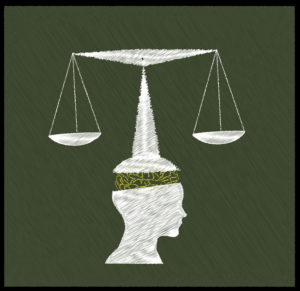Psychology of Investing

It would be far from the truth for an investor to claim that they have never made investment decisions based on their emotions. In fact, many would argue that it is impossible for one to participate in the economy without bearing aspects of their psyche. Humanity’s increasing grasp of psychology has led to vast developments in how we perceive ourselves and our actions. More recently, developments in psychology have led to the spawning of academic sectors related to economic performances, such as the field of behavioral finance. As behavioral finance has continued to evolve, scholars have gained a better understanding of how the minds of investors affect their economic decisions. Particularly, how one’s disposition can lead to mistakes. Some may be quick to assert their ability to perform outside of their psyche, others may find themselves daunted at the prospect, yet both ends of the spectrum have room for improvement. Recognizing how your psychology contributes to your investments is crucial to becoming a wise investor. Let’s take a look at some of the most common psychological traps that investors commonly find themselves stuck in.
Overconfidence

To begin, let’s discuss the most common and overlooked psychological trap: overconfidence. Investors commonly do not give overconfidence much thought. This is because managing one’s overconfidence can feel quite feasible and many may even feel immune to its ramifications. However, the dangers of overconfidence become invisible when embedded within our nature and our society. Humans are optimistic beings; we’ve always been that way. For example, 93% of Americans claim that they are better drivers than the average person: a statistic that simply makes no sense (Psychology Today). Human optimism is not always bad; in fact, it is a productive, healthy, and necessary aspect of existing in an unpredictable world. However, it can cost us in many corners of life and can especially set us back as investors. A common signal of overconfidence in the investing realm is rapid trading. If an investor is trading quite often and quickly, they may believe that they are more knowledgeable than the person on the other side of the trade. Rapid trading rarely rewards investors and can instead cost them a good sum of their money and time. Thus, it is important to monitor your interactions with the market and assess if you might be trading too quickly due to overconfidence. Another consequence of overconfidence is commonly referred to as the Anchoring Trap. In essence, the Anchoring Trap pertains to “anchoring” on a previous perception. In other words, the Anchoring Trap is one’s overreliance on what they already know/think. For example, the population in your hometown two years ago might not be the same population of today, but if asked the size of the town, you may be inclined to provide the statistic of two years ago instead of searching for a current one. You may provide the statistic of two years ago and add some estimated amount to it, but it most likely is not enough and therefore is not representative of reality. This plays out similarly in the investing world. Investors may anchor down to previous earnings or their own estimations of them, which can be dangerous and misleading. Furthermore, if an investor has been knowledgeable of a company for some time and has believed it to be successful, they may feel certain that purchasing stocks today is a good idea. However, previous success does not always indicate future success. Thus, if a buyer does decide to invest a large sum of their money into a company based on a previous perception, they may lose. The last crucial result of overconfidence is selective memory. It is easier for someone to forget painful moments, embarrassing situations, or investment mistakes than to think of them often. It is not any fault of our own that we forget these things; oftentimes, the brain sets these memories aside for us to where they are only accessible if we desire to dwell on them again. Selective memory serves humans in many ways; in order to survive, sometimes we need to shed painful memories. Yet sometimes selective memory can harm us and lead us to become more overconfident than we already are. When investing, it is easy to selectively remember every good investment and forget every bad one. It’s probably far more comfortable for most to not ponder on all the money they lost a while ago. However, the more confidence one has, the more that these uncomfortable memories challenge the perception one has of their capability and of self. Thus, sometimes selective memory takes a form that is no longer a primal survival mechanism but is rather a method of maintaining self-image. This form of selective memory is better known as cognitive dissonance where our perception of self doesn’t match situational reality.
After reading this you may now feel that the pitfalls of overconfidence are frightening and unmanageable, but that cannot be farther from the truth. Once aware of them, they become easier to evade. The best method of avoiding the overconfidence trap is to maintain flexibility. Be open to new information, be receptive to the fact that maybe your previous perceptions are no longer accurate, and be willing to change your direction based upon present-day events.
Self-Handicapping

On the other side of the spectrum from overconfidence lies what is commonly known as self-handicapping. In other words, a sort of pessimism that sabotages your chances for success. Humans are prone to self-handicapping in all areas of life. We desire to feel confident and secure in our actions and selves. Thus, a situation that contains any chance of failure signals potential harm to self. Thus, someone might attempt to rationalize failure in a way that does not harm their image and perception of self. Self-handicapping can involve prefacing an action with a negative condition to justify the potential future failure of the action. For example, a sports player might admit to a coach before a game that they don’t feel well. If the sports player’s performance wasn’t what they had hoped, they may simply claim that they played poorly due to not feeling well. Psychologists believe that self-handicapping arises from the human need to place a failure’s blame outside of self while simultaneously taking full credit for any success. Self-handicapping as we may experience it in an everyday situation does not appear to be much different within the investing world. Participating in the market brings an incredible amount of risk that can unsettle anyone. As such, those who are quite uncomfortable with failure and risk might find that they react with the market in a more pessimistic manner. For instance, an investor might admit that they didn’t spend much time researching the stock before purchasing it. That way, if their stock drops in price in the future, they can readily rationalize their failure. Self-handicapping limits one’s interaction with opportunity and success, as it may lead to lower expectations for the future and less motivation to act. It is quite difficult to fully detach from self-handicapping practices; it deeply ingrained in human nature to protect the ego and the self. Thus, the best we can do avoid handicapping ourselves is to become aware of the pitfalls of self-handicapping, affirm ourselves of our capabilities, and try our best to avoid these harmful practices.
Sunk Cost

Perhaps the most common yet invisible psychological trap humans find themselves in is the sunk cost trap. The sunk cost trap is a psychological phenomenon that concerns the money one has already been spent and cannot get back. This trap does not solely pertain to the market; in fact, many of us often find ourselves deep in the sunk cost trap in everyday life. For example, if you bought tickets to a movie and then discovered it had poor ratings, you probably would still attend the movie anyway due to the fact that the money spent would feel as though it was wasted. However, if a friend was the one who provided you the tickets, you might choose not to attend the film and spend your valuable time doing something else. A more rational response to this dilemma would be to acknowledge that it does not matter whether you purchased the tickets or someone else did; the movie is bad and most likely a waste of your time. Nevertheless, many of us wouldn’t think this way instinctively. Instead, we would feel obligated to attend a movie we wouldn’t enjoy simply to receive something from the poor investment made. This same predicament applies when one interacts with the market. It can be extremely difficult for many investors to reconcile that they have made a wrong investment decision. Thus, even when the investment is sinking, an investor will choose to hold onto their security due to an obligation to the money they have already put into it rather than cutting their losses. However, if the security was a gift, an investor would be more likely to sell the stock and cut their losses. The sunk cost is a perfect example of an investor’s intense emotional commitment to their purchases. Therefore, the sunk cost trap can be one of the most dangerous psychological traps investors may find themselves succumbing to. There is not a clear cut method for avoiding the sunk cost trap; an investor simply must be aware of their tendencies to hold onto sinking securities and catch themselves before it is too late.
Confirmation Bias

The confirmation bias is a trap that is closely related to overconfidence and anchoring. Oftentimes, when one has a positive experience with an object, company, etc. they will be more likely to believe information that supports their positive experience and disregard negative information that contradicts it. In the investing world, when an investor feels strongly about a stock, they are more likely to read financial headlines that confirm their beliefs and ignore those that challenge them. Thus, investors fall into an overconfidence trap where they can easily confirm their decisions despite the possibility that there might be a multitude of factors indicating otherwise. Self-confirmation is not the only form of confirmation bias; oftentimes, investors will seek out others who share a similar experience to validate their decisions. For example, let’s say that an investor purchased shares of Stock X and a friend of theirs also owns shares of Stock X. If Stock X drops by 20%, and either decides to hold on to their shares, they are likely to engage in confirming behavior where both validate one another that the loss is not detrimental. The confirmation trap often leads to delusions regarding the current state of one’s market affairs. It is important to acknowledge when you might be participating in confirmation behavior so that you can instead consider your investments in a realistic manner, even if it makes you uncomfortable.
Conclusion
Human psychology is one of the most incredible aspects of our nature; however, it can also be quite dangerous. We are no stranger to letting our emotions get the best of us and making the same mistakes over and over again. When the subject of stress, temptation, impulsivity, etc., we can at times engage in behavior that does not serve us, and the results may even harm us. Participating in the market is no different than reacting to any other emotional situation. The market brings a great amount of risk, and as such can cause investors a large amount of stress. Due to the volatility of the market, investors might find themselves falling into some of the mind traps listed above that ultimately may harm the state of their portfolio. A great investor is not defined by their immunity to their own psychology. The truth is, no investor will ever be able to completely evade these psychological traps; we are all bound to make mistakes every now and then. However, instead of selectively forgetting these mistakes, investors can intentionally learn from them. That is what defines a great investor: the ability to accept, learn, and move forward.
